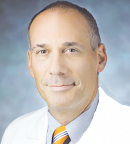The investigational bispecific antibody mosunetuzumab is showing activity in preliminary studies of patients with non-Hodgkin lymphoma (NHL), including those who are refractory to or relapsed after third-line chimeric antigen receptor (CAR) T-cell therapy. If preliminary findings are validated by further study, mosunetuzumab, and perhaps other bispecific antibodies in development, may present an option after CAR T-cell therapy for patients with B-cell lymphomas and leukemias who no longer have treatment options.
The results of a global, open-label, multicenter, phase I/Ib study of mosunetuzumab showed durable efficacy in some patients with heavily pretreated relapsed or refractory B-cell NHL, including complete responses in some patients with disease progression after CAR T-cell therapy.1 These findings led to the selection of this abstract from among 3,000 submissions as one of 6 studies presented at the plenary session of the 2019 American Society of Hematology (ASH) Annual Meeting & Exposition.
“People might ask why this early dose-finding phase Ib study was chosen for the ASH plenary session. It’s because everyone wants to hear these data,” said Stephen J. Schuster, MD, of Abramson Cancer Center at the University of Pennsylvania, Philadelphia, one of the key investigators in studies of CAR T-cell therapy. According to Dr. Schuster, if these early results are validated in larger data sets and trials, mosunetuzumab may have a potential role as a bridge treatment to CAR T-cell therapy or as a rescue treatment for patients who fail to respond to CAR T-cell therapy.

If these early results are validated in larger data sets and trials, mosunetuzumab may have a potential role as a bridge to CAR T-cell therapy or as a rescue for those who fail to respond to CAR T-cell therapy.— Stephen J. Schuster, MD
Tweet this quote
A number of studies of mosunetuzumab are ongoing in lymphoma and other B-cell malignancies, including phase Ib/II studies in NHL as monotherapy and in combination with other drug regimens used to treat NHL, such as R-CHOP (rituximab plus cyclophosphamide, doxorubicin, vincristine, prednisone), CHP (cyclophosphamide, doxorubicin, prednisone), or the antibody-drug conjugate polatuzumab vedotin. Other bispecific antibodies are under development, and early studies of some of these agents also were presented at the ASH meeting.
Mechanism of Action and Administration
Mosunetuzumab binds to CD20 on the surface of malignant B cells and to CD3 on the surface of cytotoxic T cells, resulting in crosslinking of the T-cell receptor and subsequent activation of an immunologic T-cell response. In preclinical lymphoma models, mosunetuzumab induced T-cell proliferation and B-cell death.
Mosunetuzumab is an off-the-shelf product, requiring no time for manufacturing, whereas manufacture of CAR T cells is a laborious process that takes 3 to 4 weeks and relies on the use of each patient’s own T cells. Mosunetuzumab is given via intravenous infusion.
Background
“CAR T-cell therapy was the first therapy in about 20 years [since the introduction of rituximab] to make a dent in the outcomes of patients with B-cell lymphoma who failed to respond to second-line treatments. Whatever the data source, long-term follow-up of various CAR T-cell products shows that about one-third of patients have sustained remissions. The number of remissions once was close to zero, and we are happy about the one-third of patients who will live.”
“However, as clinicians, we see 100% of patients, so we need something to offer the two-thirds of patients who have no reliable treatment options after failing to respond to available therapies,” Dr. Schuster explained. “The vast majority of these patients will live only another few months, and we desperately need solutions for them.”
Study Details
The study Dr. Schuster reported on at the ASH meeting enrolled exactly those patients. “Nobody on this trial had a good prognosis,” he noted. “A total of 30 patients received CAR T-cell therapy previously, and the other patients would have all gone on to clinical trials of CAR T-cell or commercial CAR T-cell therapy.”
Of the 270 patients treated to date with mosunetuzumab, 193 were evaluable for efficacy, including 124 (65%) with aggressive lymphoma (mainly diffuse large B-cell lymphoma or transformed follicular lymphoma) and 67 (35%) with indolent lymphoma (mainly follicular lymphoma). “‘Indolent’ is actually a misnomer in this case,” noted Dr. Schuster, “because all of these patients failed to respond to other therapies and were in dire need.”
The overall group of patients included those with disease progression after stem cell transplantation as well as those with relapsed or refractory disease after CAR T-cell therapy. For all patients enrolled in the dose-finding study, the median number of prior therapies was three (range, 1–14).
Planned dose escalation was as follows: step-up dosing on days 1, 8, and 15 of cycle 1, followed by a fixed dose on day 1 of each subsequent 21-day cycle, with a maximum of 17 cycles. Outcome measures included best objective response rate according to revised International Working Group criteria, maximum tolerated dose, and tolerability.
Key Findings
Of the group with aggressive lymphomas, 46 (37%) had an objective response, and 24 (19%) were in complete remission. Among the group with indolent lymphomas, 42 (63%) had an objective response, and 29 (43%) achieved complete remission.
Of the 30 patients on study who previously received CAR T-cell therapy, 18 were evaluable for response. “These 18 patients had been treated with mosunetuzumab for about 3 months, which is the metric by which we measure CAR T-cell response,” Dr. Schuster explained. Of these 18 patients, 7 had an objective response rate (39%), and 4 (23%) had a complete response. “Some of the patients in the complete-response group are now off mosunetuzumab,” he noted.
In some patients previously treated with CAR T-cell therapy, molecular testing revealed an increase in the number of CAR T cells after treatment with mosunetuzumab. “This could mean that not only does mosunetuzumab have the ability to kill cancer, but also that it may help re-engage CAR T cells and boost the effect of the prior CAR T-cell treatment,” Dr. Schuster suggested, but further study is needed to confirm this theory.
Toxicity
At the time of the ASH presentation, the maximal tolerated dose had not yet been reached at doses of mosunetuzumab up to 60 mg. Adverse events leading to treatment withdrawal were uncommon, occurring in about 5.5% of patients. Cytokine-release syndrome was reported in 28.4% of patients, mostly grade 1 or 2, and it occurred early in the course of treatment. Grade 3 cytokine-release syndrome occurred in 1.4% of patients. Tocilizumab was used to manage cytokine-release syndrome for three events, and all resolved.
Neurologic adverse events (another concern with CAR T-cell therapy) occurred in 44% of patients: grade 1 in 27.4%, grade 2 in 12.6%, and grade 3 in 3.7%. The most common neurologic adverse events were headache (15.6%), insomnia (9.3%), and dizziness (9.3%). Three patients experienced a grade 1 or 2 confusional state during the first two cycles of treatment.
“There appeared to be a nonlinear relationship between cytokine-release syndrome and neurologic effects and exposure to mosunetuzumab, likely due to the step-up dosing. This dosing strategy largely mitigates acute toxicities and allows administration of higher doses,” Dr. Schuster noted.
The frequency of cytokine-release syndrome and neurologic adverse events was similar in the 30 patients who were previously treated with CAR T-cell therapy. Re-treatment with mosunetuzumab in four patients did not lead to cytokine-release syndrome, but one patient developed neurologic adverse events.
Additional Commentary
ASH Secretary Robert A. Brodsky, MD, of Johns Hopkins University School of Medicine, Baltimore, commented on this study at a premeeting press webinar: “This is the most exciting of the plenary abstracts and represents a fundamental change in how we conceptualize the treatment of B-cell malignancies.”

This is the most exciting of the plenary abstracts and represents a fundamental change in how we conceptualize the treatment of B-cell malignancies.— Robert A. Brodsky, MD
Tweet this quote
“Mosunetuzumab is not a CAR T-cell therapy,” Dr. Brodsky continued. “It is an off-the-shelf bispecific antibody that targets CD3 and CD20, engaging patients’ own T cells to do what CAR T cells would do. This product is simpler and faster to produce [than CAR-T-cell therapy] and is likely to be less expensive and less toxic,” he noted.
Dr. Brodsky speculated about the future of bispecific antibodies. “We still need further study to determine the durability and tolerability of mosunetuzumab and other bispecific antibodies. If these drugs can do what CAR T-cell therapy can do, this would represent a big advance with the potential for a paradigm shift.”

Aaron T. Gerds, MD
Chair of the ASH Committee on Communication, Aaron T. Gerds, MD, of Cleveland Clinic Taussig Cancer Institute, also weighed in on this study during the webinar. “I agree with Dr. Brodsky that these data are exciting and that these bispecific antibodies have the potential to be a major advance.”
Dr. Brodsky added: “CAR T-cell therapies are here to stay, but the question is whether bispecific antibodies will encroach on them.” ■
DISCLOSURE: Dr. Schuster disclosed financial relationships with Genentech, Merck, Pharmacyclics, Acerta, AbbVie, Gilead, Pfizer, and Novartis. Dr. Brodsky is an advisor/board member with Apellis and Alexion; is a consultant for Achillion; and has received research funding from Achillion and Alexion. Dr. Gerds has had a consulting/advisory role with Incyte, AstraZeneca/MedImmune, and CTI; and has received research funding from Pfizer, CTI, Incyte, Roche/Genentech, Gilead Sciences, and Celgene.
REFERENCE
1. Schuster SJ, Bartlett NL, Assouline S, et al: Mosunetuzumab induces complete remissions in poor prognosis non-Hodgkin lymphoma patients, including those who are resistant to or relapsing after chimeric antigen receptor T-cell therapies, and is active in treatment through multiple lines. 2019 ASH Annual Meeting & Exposition. Abstract 6. Presented December 8, 2019.

